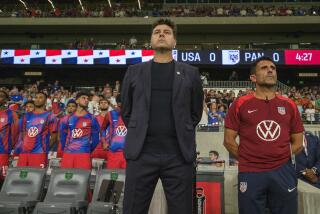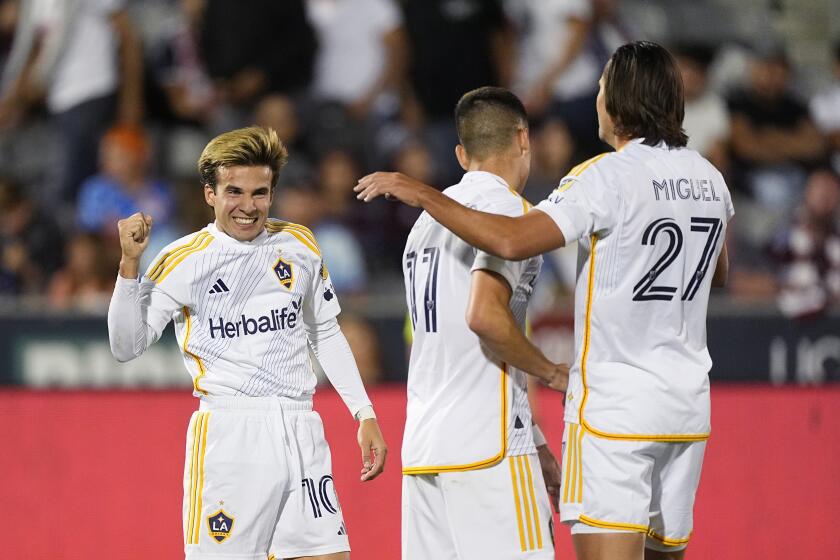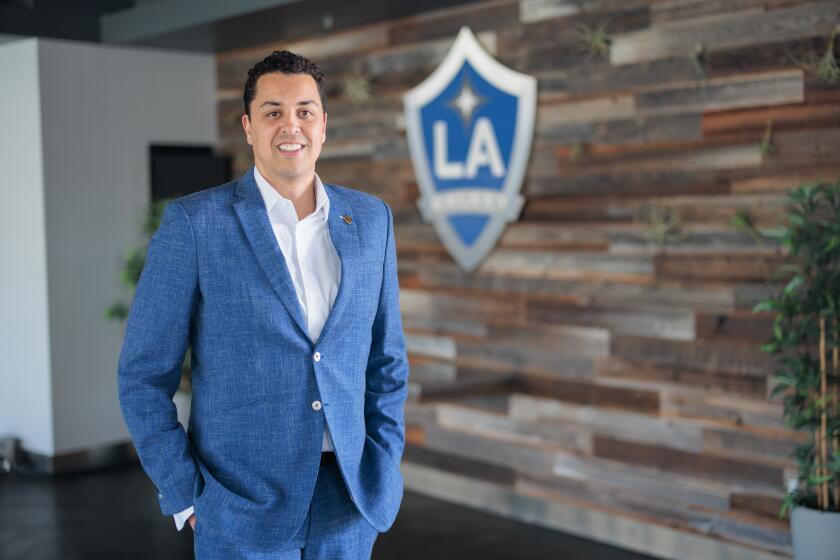World Cup Selections Based on Experience
Sometime last October, after the United States had defeated Jamaica and clinched its place in the 2002 World Cup, Bruce Arena got out a yellow legal pad and started doodling.
When he found out in December that the U.S. would be playing Portugal, South Korea and Poland in the first round of soccer’s quadrennial world championship, that doodling became a bit more serious.
And on Monday, 31/2 years after becoming coach of the American team and after playing 57 games and taking a close look at 93 players, Arena finally finished jotting down names and scratching lines through some of them.
At 10 a.m., he picked up the telephone and called DaMarcus Beasley in Chicago, telling the 19-year-old Fire midfielder that he made the cut, that he was part of the 23-man U.S. roster for Korea/Japan ’02.
Beasley was the only player Arena contacted Monday. For the most part, his weekend and that of his assistant coaches was spent delivering bad news, telling players that they would not be going to the World Cup.
That done, the team can now start preparing in earnest for the U.S. team’s opening game on June 5 against Portugal in Suwon, South Korea.
On paper, the 2002 U.S. team is considerably stronger than the one former coach Steve Sampson took to the France ’98 World Cup, where it was ousted in the first round after losing to Germany, Iran and Yugoslavia.
For one thing, it is older and more experienced, with an average age of 28.7 years. Eleven players are holdovers from Sampson’s 1998 team.
“I don’t think it’s bad having a team that’s almost 29 years old,” Arena said. “Hopefully, the experienced players are going to help us. That’s why there are so many veterans on this team.”
The goal of all 32 countries taking part in the May 31-June 30 tournament is to win it, but the U.S. is among the longest of longshots.
“If everyone aspires to win a World Cup, we have a long way to go,” Arena admitted, “but we have come a long way. If you compare this team to the 1990 team, there’s no comparison.
“If you compare this team to the 1994 and 1998 teams, I believe it’s a better team based on the quality from top to bottom, and the [amount of] experience.”
That said, Arena recognizes the gap that still exists between the U.S. and the legitimate World Cup contenders.
“It’s no secret that the reason France and Argentina are odds-on favorites to win the World Cup is that they have the best players,” he said.
“They have considerable talent. They’re leaving players home who could make our team.
“We need to just improve the depth in our program and the quality, and that’s going to take time.”
Arena split his choices almost evenly between players from Major League Soccer and those playing for European teams.
Although there are three of his former players from the University of Virginia among the 23--Jeff Agoos, Claudio Reyna and Tony Meola--sentiment was not a factor in their selection.
“I selected this roster based on one simple thought: which 23 players could help us be successful,” Arena said. “We don’t look at anything else besides that fact.”
Cobi Jones was the only Galaxy player chosen and became one of seven players to make three World Cup rosters, along with goalkeepers Meola, Brad Friedel and Kasey Keller, midfielders Reyna and Earnie Stewart and forward Joe-Max Moore.
The players will gather in Cary, N.C., on May 1 for 10 days before moving north for three final warmup games: against Uruguay at Washington, on May 12; against Jamaica at East Rutherford, N.J., on May 16; and against the Netherlands at Foxboro, Mass., on May 19.
The team leaves for South Korea on May 23. How far it will go once it gets there remains a question, but Arena is optimistic.
“I’ve never been a guy that sets a whole lot of goals out there,” he said. “But our players aren’t stupid, they want to advance. That’s part of the challenge in a World Cup.
“Our focus over the next six weeks is going to be Portugal, and after Portugal, South Korea, and then Poland.
“If we take it one game at a time, we get a few breaks, we play well, we take advantage of the opportunities, perhaps we’re going to put ourselves in position to be in the round of 16.”
*
(BEGIN TEXT OF INFOBOX)
U.S. World Cup Roster
*--* Player Age Club Minutes* GOALKEEPERS Brad Friedel 30 Blackburn Rovers 90 (England) Kasey Keller 32 Tottenham Hotspur 180** (England) Tony Meola 33 Kansas City Wizards 630 DEFENDERS Jeff Agoos 33 San Jose None ** Earthquakes Gregg Berhalter 29 Crystal Palace None (England) Frankie Hejduk 27 Bayer Leverkusen 199 (Germany) Carlos Llamosa 32 New England None Revolution Pablo Mastroeni 25 Colorado Rapids None Eddie Pope 28 D.C. United 180 ** Tony Sanneh 30 FC Nurnberg None ** (Germany) David Regis 33 FC Metz (France) 270 ** MIDFIELDERS Chris Armas 29 Chicago Fire None ** DaMarcus Beasley 19 Chicago Fire None Landon Donovan 20 San Jose None Earthquakes Cobi Jones 31 Galaxy 421 Eddie Lewis 27 Fulham (England) None John O’Brien 24 Ajax Amsterdam None ** (Netherlands) Claudio Reyna 28 Sunderland 270 ** (England) Earnie Stewart 33 NAC Breda 540 ** (Netherlands) FORWARDS Clint Mathis 25 New York/New None ** Jersey MetroStars Brian McBride 29 Columbus Crew 180 ** Joe-Max Moore 31 Everton (England) 148 Josh Wolff 25 Chicago Fire None *--World Cup experience; **--Probable starters
*--*






